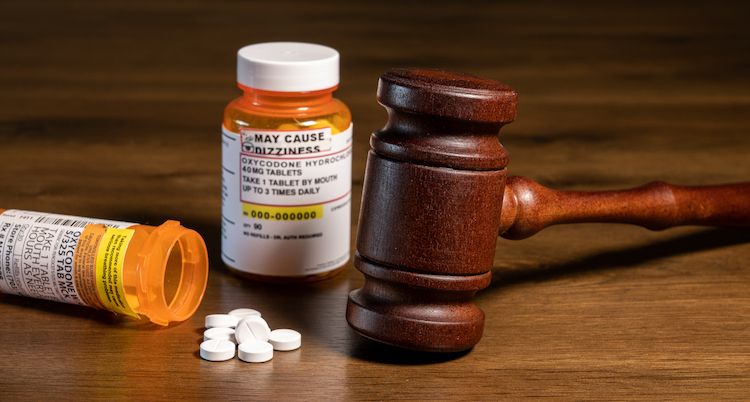Federal judge rules for drug distributors in opioid trial, says case fails under West Virginia nuisance law

Image from Shutterstock.
A federal judge has ruled for three major drug distributors in a bench trial contending that their conduct created an opioid epidemic in Huntington, West Virginia, and the state’s Cabell County.
Senior U.S. District Judge David A. Faber of the Southern District of West Virginia ruled for the McKesson Corp., the AmerisourceBergen Corp. and Cardinal Health Inc. in a July 4 opinion.
Reuters, the Washington Post, the New York Times and the Associated Press (here and here) have coverage.
The drug companies had distributed 81 million prescription painkillers over eight years in Cabell County, West Virginia.
Faber said the West Virginia plaintiffs failed to show that the drug companies’ acts caused the oversupply of opioids in Cabell County and Huntington.
“Doctors, 99% of whom were acting in good faith, determined the total volume of prescription opioids,” Faber wrote.
Faber also said the two governmental bodies could not sue under public nuisance law as applied by West Virginia’s top court. The Supreme Court of Appeals of West Virginia has applied public nuisance law only when a defendant’s conduct interferes with public property or resources, Faber said.
Those nuisance rulings are consistent with the Restatement of Torts (3d), which says most state courts have rejected nuisance lawsuits based on the sale and distribution of a product, Faber said. Two lower court decisions in West Virginia do apply the law of public nuisance to the sale and distribution of opioids, but the decisions “are not persuasive and are inconsistent with the Restatement of Torts,” Faber said.
Faber also cited rulings by top state courts in Connecticut and Oklahoma that decline to extend the doctrine of public nuisance to the sale or manufacturing of opioids.
The AmerisourceBergen Corp. said the decision strikes down the notion that distributing drugs approved by the U.S. Food and Drug Administration to licensed health care providers could be a public nuisance.
Several West Virginia communities have pursued trials rather than join a national $21 billion opioid settlement with the three drug distributors. Cabell County and Huntington thought that they could achieve a better outcome in their own trial and sought $2.6 billion from the three companies. The state of West Virginia had previously resolved its own cases against the drug distributors for $73 million.
More than 100 West Virginia cities and counties have also sued in state court. A judge granted a continuance in that case after the federal verdict in the Cabell County suit.
The New York Times spoke with Elizabeth Burch, a professor at the University of Georgia School of Law, about Faber’s ruling.
“Trial is always a gamble, and this one didn’t pay off,” Burch said. The outcome is “very much a cautionary tale about opting out of the surefire money a settlement offers.”



